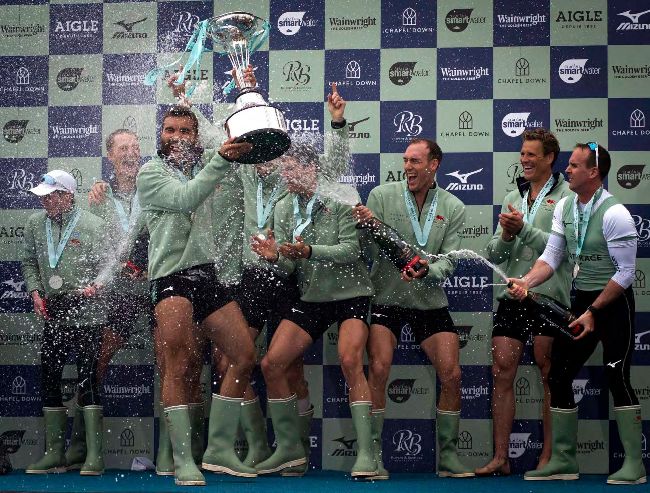Tactician’s View
Matthew Holland, who coxed both the Cambridge women and the men, explains the tactical nuances of racing in Ely rather than on the Tideway
WORDS / MATTHEW HOLLAND

Matthew Holland after winning the 2017 women’s race on the Tideway, London
One of the beautiful things about the Boat Race is that many stars must align in order to win it. It is not enough to just be fitter, or to row better, or to be mentally tougher than your opposite number; one mistake on the day can bring six months of very hard work crashing down quickly.
To mitigate the risk of a fatal error, the crews and coaching teams spend a lot of time analysing previous races, learning from how their predecessors responded to the many scenarios that can arise on race day. Many hours are spent sitting around a map of the course, drilling into your brain how much water you can let them take on the Surrey bend and still come back, how hard you should work on the outside of the bend to keep in contact, how far ahead you need to be at each point to be confident of victory. The crews sit on the start line with a thorough understanding of how to react to almost any situation that could be thrown at them.

Matt Holland (far left) celebrates with teammates after winning the 2019 men’s race on the Tideway, London
The change of location, from the Tideway in London to the Ouse in Ely, has posed an interesting challenge for the crews. There is no recent precedent to learn off, no opportunity to analyse others’ mistakes. The essentially straight course, with direct wind and little stream, is likely to mean that the tactics discussed in the build-up and deployed by the crews on the day will be very different.
A shorter course, when combined with the lack of bends and the curtailed training period the teams have had on the water, will likely see a lot more importance placed on the first 500m of the race. In London it is far more important that the start is clean than is particularly fast. As long as you aren’t dropped you still have plenty of river and at least one bend in your favour to get ahead. For the essentially straight course in Ely, getting early control of the race will be an enormous advantage.
This is particularly the case in the Oxford boat. They will go into the race knowing that their opposition have a far superior knowledge of the course than they do and have had the opportunity to practise different scenarios in situ. It will be dangerous for them to give any water early on, as they will not have the same sub-conscious knowledge of where they are, and thus how much time they have left to get ahead. The temptation for them would then be to give too much early on to try and get back, and this could end up costing them dearly. Oxford’s best chance of success is to take charge early on, and force Cambridge to make a mistake. This strategy is not without its risks, however. If Oxford can’t shake Cambridge off, then they risk blowing up on unfamiliar waters, leaving them sitting ducks to an attack. It will take discipline and very mature racing to execute such a strategy successfully.
“The Ely Boat Race has the potential to be one of the tightest contests in living memory.”
Cambridge, on the other hand, will want to ensure that they are as calm and relaxed as possible. Oxford will try to put them under pressure early on, but if they can stay focused and maintain contact, then the home advantage will come into play in the latter stages. The lack of bends means that the Light Blues can afford to give Oxford some water in the first half, in the knowledge that their superior experience of the course, and the cox’s ability to seek shelter from the wind, will allow them to reel any lead back in through the last 2000m. If they can be relaxed when down and lull Oxford into a false sense of security, before pushing hard into the last 7 minutes, then they will put themselves in a very strong position.
In my opinion, the Ely Boat Race has the potential to be one of the tightest contests in living memory. The straight, featureless course means that this will be more of a test of each crew’s discipline and the cox’s race craft than the crew’s ability to handle the conditions and steer the Thames. Oxford will sit on the start line absolutely burning to overcome their rival’s home advantage, and Cambridge will have to be very disciplined in their racing if they want to take full advantage of their native waters. This year more than ever no one can afford a mistake, but with so few opportunities for practise, every athlete is going to have to be on top of their game come the 4th April.